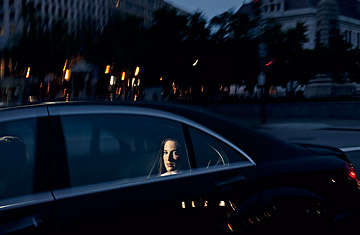
Sweet Ride. Uber D.C.'s Rachel Holt in one of her company's digitally dispatched luxury sedans. Some riders use them to get groceries.
(4 of 6)
No one doubts that the kids are changing the city. When Shana Glickfield, founder of a social-media firm, arrived in Washington in the early 2000s, one of her ears was triple-pierced. "I had to go up on [Capitol] Hill, and everybody said, You can't do that, not if you're going to the Hill!" she says. "Now I see Hill staffers with nose rings." The 20-somethings have helped Washington shed its image as an uptight, work-first, party-later town. "Happy hour is the most important hour of the day," says Emily Schultheis, a Web editor and recent arrival. "It's how you meet people, how you get jobs, how you find roommates, how you get tips for stories and how you get in trouble." Hill staffers devote Thursday nights to "wheels up" parties. "Congress goes out of session on Thursdays," says Abra Belke, a lobbyist and blogger who calls herself Belle and writes the popular blog Capitol Hill Style. "Most of the bosses go home for the weekend. So you put your boss on the plane, wheels up, and then--freedom!"
ber-Washington has its own career pattern that is becoming as routinized as that of a 1950s organization man. A student graduates and goes to Washington for an internship, usually unpaid, which qualifies her for another internship, perhaps paid, until an entry-level job is offered, as it almost always will be. "Then you work for a few years," Glickfield explains, "and then you go off and get the next degree, law or business, and then you come back for a better job." Colleges and universities have figured this out and moved quickly to get a place on the conveyor belt. Big state schools and smaller liberal-arts colleges occupy office buildings in the city, where they run sophisticated internship programs designed to place their graduates (and soon-to-be graduates) in one of the country's few hot job markets.
As national politics makes it impossible to expand government explicitly, these interns--often underpaid, usually overworked and frequently subsidized by their parents--have become vital to keeping government going. At the same time, they contribute to a feature of ber-Washington that too often goes unremarked: the capital has one of the most lopsided distributions of wealth of any major metropolitan area in the U.S. Along with a higher per capita income than any state and one of the nation's lowest rates of unemployment, Washington has a poverty rate of nearly 20%, above the national average of 15%; a public-school system that is often called the worst in the nation; and a crime rate that remains higher than in any other rich community. In the district, whites enjoy a per capita income nearly three times that of African Americans.
